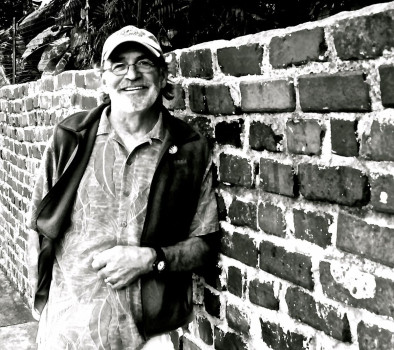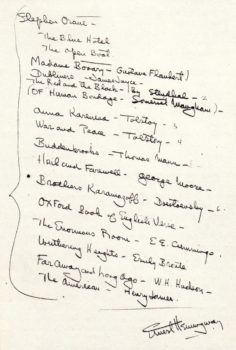This is a review copied (without permission – for reference only) from a published article: Books: New York Times On The Web
October 17, 1937
Ernest Hemingway’s First Novel in Eight Years
By J. DONALD ADAMS
|
TO HAVE AND HAVE NOT By Ernest Hemingway. |
 his is Mr. Hemingway’s first novel since “A Farewell to Arms” was published eight years ago. He has in the meantime produced a volume of short stories, “Winner Take Nothing,” and two other books, “Death in the Afternoon” and “Green Hills of Africa.” He has been, since he was first published, a normally productive writer. It would be pleasant to add that he is also a writer who has grown steadily in stature as well as in reputation. But this, unfortunately, would not be the truth. His skill has strengthened, but his stature has shrunk.
his is Mr. Hemingway’s first novel since “A Farewell to Arms” was published eight years ago. He has in the meantime produced a volume of short stories, “Winner Take Nothing,” and two other books, “Death in the Afternoon” and “Green Hills of Africa.” He has been, since he was first published, a normally productive writer. It would be pleasant to add that he is also a writer who has grown steadily in stature as well as in reputation. But this, unfortunately, would not be the truth. His skill has strengthened, but his stature has shrunk.
Perhaps this last statement has a paradoxical sound. I mean simply that what discipline could add to talent has, in his case, been added. He has moved steadily toward mastery of his technique, though that is by no means the perfect instrument it has been praised for being. Technique, however, is not enough to make a great writer, and that is what we have been asked to believe Mr. Hemingway was in process of becoming. The indications of such a growth are absent from this book, as they have been absent from everything Mr. Hemingway has written since “A Farewell to Arms.” There is evidence of no mental growth whatever; there is no better understanding of life, no increase in his power to illuminate it or even to present it. Essentially, this new novel is an empty book.
Such statements, naturally, demand to be amplified. Mr. Hemingway has been for some years an outstanding figure in American literature; he has influenced greatly men a little younger than himself, and they have paid him the tribute of imitation. Whatever he does is of interest because he has, unquestionably, a very real talent. What has he done with it in “To Have and Have Not”?
He has written the story of a tough guy in Key West, a man called Harry Morgan, for whom, implicitly, he asks our sympathy. Harry was a big bruiser of a man, hard as they come, happily married by reason of a strong physical attachment, the father of two girls. He owned a fast motor boat, which got him his living. Normally he took out fishing parties, but when he thought he could get away with it, and when the money offered seemed a fair balance for the risk, he was ready to do other things as well. He ran liquor, he smuggled Chinamen, and he met his end providing a getaway for a gang of hold-up men. Once, at least, he killed in cold blood just to make sure the job would come cleanly off.
All right, says Mr. Hemingway, by implications as wide as a barn door, society is to blame for this. On his deathbed, shot through the stomach, Harry tries to say what life has taught him. As the captain and mate of the Coast Guard cutter lean over him, they hear him struggle to get it out:
“Like trying to pass cars on the top of hills. On that road in Cuba. On any road. Anywhere. Just like that. I mean how things are. The way they been going. For a while, yes sure all right. Maybe with luck. A man.” He stopped. . . .
“A man,” Harry Morgan said, looking at them both. “One man alone ain’t got. No man alone now.” He stopped. “No matter how a man alone ain’t got no bloody–chance.”
He shut his eyes. It had taken him a long time to get it out and it has taken him all of his life to learn it.
There is nothing in Mr. Hemingway’s story to indicate that Harry Morgan had ever tried to get his living by honest and lawful means. All he asked of a job was whether he could get away with it, with profit to himself. Society, so far as we have his story, owed him nothing. And he got, in the end, precisely what was coming to him. There is no tragedy; there is no ground for compassion.
“To Have and Have Not.” Harry Morgan, Mr. Hemingway apparently would tell us, was numbered among the have-nots because he believed he could play the game alone. As his wife thought of him after his death, he was “snotty and strong and quick, and like some kind of expensive animal. It would always get me just to watch him move. . . .”
But if the have-nots haven’t the strength, standing alone, to get what they want, let them stand together, then everything will be all right. Harry Morgan’s failure to feel an obligation to society is of no matter. There is no other possible thesis for Mr. Hemingway’s tale.
The human will, in Hemingway, as some percipient critics have already pointed out, approaches the vanishing point. As Mr. John Peale Bishop wrote, in that brilliant analysis of Hemingway which appeared in “After the Genteel Tradition,” in his novels “men and women do not plan; it is to them that things happen. In the telling phrase of Wyndham Lewis, the ‘I’ in Hemingway’s stories is ‘the man that things are done to.'”
Nor does Mr. Hemingway help his case by the introduction of his hand-picked specimens of the idle rich and their parasites, and of the morally rotten whom he shows us in brief close-ups, in their anchored yachts on the night that Harry Morgan died. They are people who, in one form or another, have existed in every age. They are not to be laid on the doorstep of economic royalism. This is adolescent thinking, though the writing is maturely skilled.
The expertness of the narrative is such that one wishes profoundly it could have been put to better use. There is cumulative power and telling economy of phrase. There is driving action. And there is also pointless brutality, passages of purely sadistic writing. The famous Hemingway dialogue reveals itself as never before in its true nature. It is false to life, cut to a purely mechanized formula. You cannot separate the speech of one character from another and tell who is speaking. They all talk alike.
In spite of its frequent strength as narrative writing, “To Have and Have Not” is a novel distinctly inferior to “A Farewell to Arms.” There is nothing in it comparable to the final chapter of the earlier book, or to the story of the retreat from Caporetto. Mr. Hemingway’s record as a creative writer would be stronger if it had never been published.

